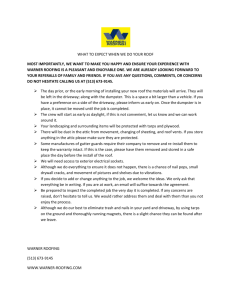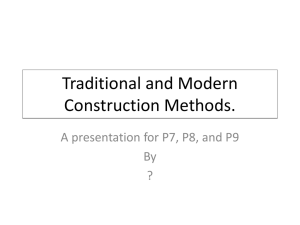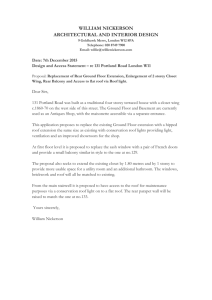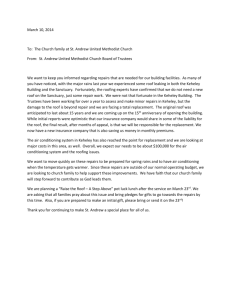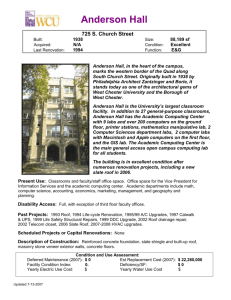Architecture: Residential Drafting and Design Name: Chapter 1: The
advertisement
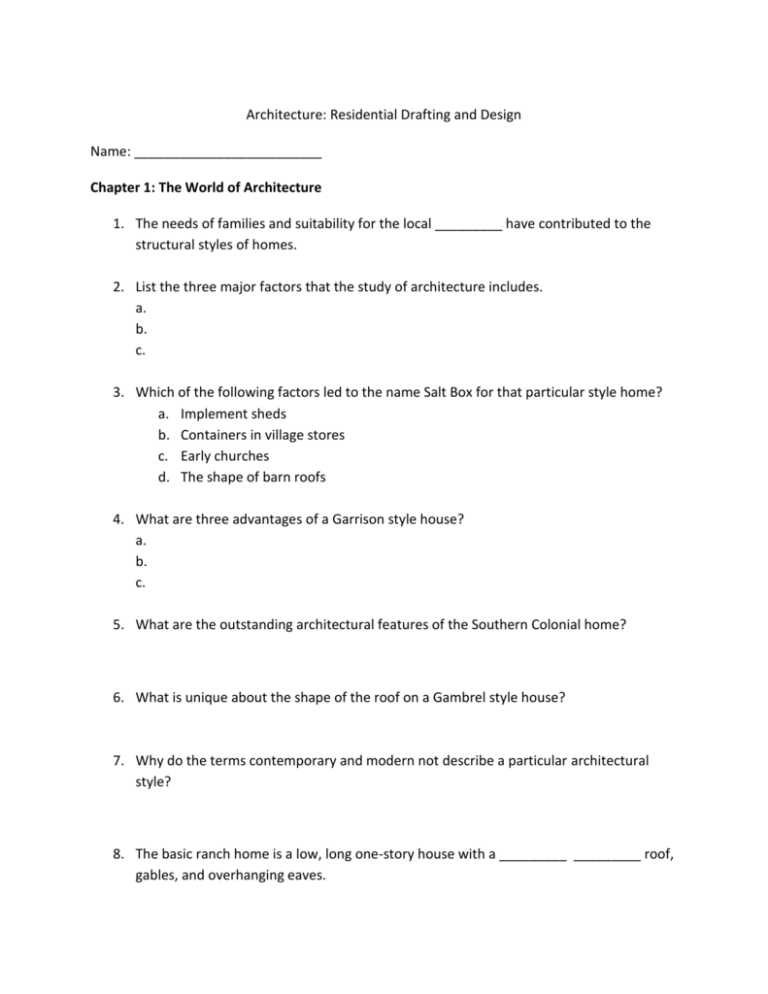
Architecture: Residential Drafting and Design Name: _________________________ Chapter 1: The World of Architecture 1. The needs of families and suitability for the local _________ have contributed to the structural styles of homes. 2. List the three major factors that the study of architecture includes. a. b. c. 3. Which of the following factors led to the name Salt Box for that particular style home? a. Implement sheds b. Containers in village stores c. Early churches d. The shape of barn roofs 4. What are three advantages of a Garrison style house? a. b. c. 5. What are the outstanding architectural features of the Southern Colonial home? 6. What is unique about the shape of the roof on a Gambrel style house? 7. Why do the terms contemporary and modern not describe a particular architectural style? 8. The basic ranch home is a low, long one-story house with a _________ _________ roof, gables, and overhanging eaves. 9. New design concepts and additions to the basic ____________ style have probably added more to the development of contemporary or “futuristic” homes than any other major factors. 10. List four factors that appear to be influencing new trends in architectural design. a. b. c. d. 11. A trend or “style” that combines traditional and contemporary influences is called __________ _________. 12. How does a condominium differ from a cooperative? 13. What aspects of rental property might persuade a person to rent rather than buy a house? 14. How is the ADA enforced? 15. What is the basic purpose of the ADA? Chapter 2: Basic House Designs 1. List the four basic residential home designs. a. b. c. d. 2. Identify five advantages of the ranch-style house. a. b. c. d. e. 3. List five disadvantages of the ranch-style house. a. b. c. d. e. 4. A one-and-one-half-story house can be recognized by its ___________ ___________, which often has ____________ to allow light into the attic. 5. The one-and-one-half-story has two distinct advantages ----- _______________ and ______________. 6. One of the most economical houses to build is a __________ design. 7. List three negative aspects of the two-story house. a. b. c. 8. The _____________design was developed to solve the problem of a sloping or hilly lot. 9. Name the four levels of the split-level design. a. b. c. d. 10. List three variations of the split-level. a. b. c. 11. Why are dormers usually added to the one-and-one-half-story house? 12. In a split-level house, the basement “foot-print” usually equals what percentage of the house “footprint?” a. 10 to 20 percent b. 20 to 40 percent c. 40 to 60 percent d. 60 to 80 percent 13. Which house design variation looks like a two-story form the front and a ranch from the rear? 14. Traffic circulation must be planned for maximum efficiency of _______________. Chapter 3: Primary Considerations 1. List 12 factors, with respect to the design and location of a house, that should be considered when planning a residential structure. a. b. c. d. e. f. g. h. i. j. k. l. 2. The document that lists any legal claims against the property is called a _____________. 3. The ________________ is a legal document that transfers ownership of property. 4. List eight site features that may be found on a topographical drawing of the site. a. b. c. d. e. f. g. h. 5. If a home is to have its own septic system and water supply, the lot should be at least ___________ in size. However, local codes may require a larger site or allow a small site. 6. What determines whether or not a house is functional? 7. List ten individual and family activities that space should be provided for in a house. a. b. c. d. e. f. g. h. i. j. 8. Why should one plan a house using standard (modular) sizes? 9. Exterior wall should be lengths divisible by ______________ feet. 10. List the drawings which are ordinarily included in a set of residential house plans. 11. Why should a title search be made before purchasing the lot? 12. List four things that determine how much you can afford for housing a. b. c. d. 13. Ownership of property is assigned through a legal document called a __________. 14. What is the difference between take-home pay and gross annual income? 15. A rule-of-thumb for determining how much you can spend on the purchase of a home is a sale price that is not greater than ____________ times your gross annual income. Chapter 7: Rooming Planning-Sleeping Area and Bath Facilities 1. In bathroom design, which two electrical safety concerns must always be addressed? a. b. 2. List the three basic areas into which a residential structure may be divided. a. b. c. 3. In some design situations, a ______________ is used to subdivide the bath into two compartments. 4. Which three materials are often used for bathroom showers in luxury homes? a. b. c. 5. Which three materials are commonly used for prefabricated bathroom showers in average homes? a. b. c. 6. Less space is wasted when the bedroom door is located near a ________ of the room. 7. FHA specifications recommend a minimum of _________ linear feet of closet rod space for a woman and _________ for a man. 8. FHA recommends that the minimum bedroom size be no smaller than: a. 100 square feet b. 150 square feet c. 200 square feet d. 250 square feet 9. A minimum size bathroom is ___________________. 10. Bathtubs range in size from 28” x 54” to 32” x 72”. The most common size is ______________. 11. List four types of doors generally used for closets. a. b. c. d. 12. A ¾ bath contains only a __________, ____________, and _______________. 13. Allow ____________ from the underside of the sink to the floor for wheelchair armrests. 14. Name two advantages of a wall-mounted water closet. a. b. 15. _____________ must be well anchored, should be 1-1/4” in diameter, have a profile that can be easily grasped with no sharp edges, and should be no further than 1-1/2” away from the wall. Chapter 8: Rooming Planning-Living Area 1. The normal width of an entry door is ______________. 2. What is the purpose of the foyer? 3. A dining room measuring 16’ x 20’ would be considered a______________- size room. 4. List at least four ways in which the dining area may be separated from the living room without using a full-height wall. a. b. c. d. 5. List five questions that should be answered when determining the size and design of a living room. a. b. c. d. e. 6. The living area of a residential structure comprises about ______________ of the total area of a house. 7. How does a porch differ from a patio? 8. List the three basic types of entryways. a. b. c. 9. Standard interior and exterior door height is __________________. 10. List the rooms that typically comprise the living area. 11. Identify three special-purpose rooms that may be in the living area. a. b. c. 12. A porch without a roof is called a(n) _______________. Chapter 9: Rooming Planning-Service Area 1. Kitchen cabinets are produced in standard widths, heights, and depths. The standard width increment is ________________. 2. The dimensions of a single car garage are approximately _______________. 3. The minimum width of a driveway for a single car garage is ______________. 4. A clothes care center should provide for which activities? List at least four. a. b. c. d. 5. Identify the six basic kitchen designs. a. b. c. d. e. f. 6. The maximum acceptable length of a work triangle is ____________ feet. 7. The service area of a home generally includes which individual areas? 8. Kitchen base cabinets are normally _____________ high. 9. Exhaust fumes from a kitchen hood fan should not be expelled into the ____________. 10. List common materials in which overhead doors are available. 11. The standard width of a kitchen base cabinet is ______________. 12. The counter height for a kitchen eating area that is designed for chairs should be _____. Chapter 19: Roof Designs 1. Give the names of ten distinct roof types a. b. c. d. e. f. g. h. i. j. 2. The purpose of roof framing is_________________. 3. The roof framing member that extends from the ridge to the top plate or beyond is called a(n)______________. 4. If a roof has a pitch of 3:12 and the rise is 6’, the span is________________. 5. The roof span is measure from ____________ to _____________. 6. The _____________ of a roof is one-half the span. 7. The formula for calculating the fractional pitch of a roof is ______________. 8. The pitch of a roof that has a slope of 45° is ______________. 9. List three things that determine rafter size. a. b. c. 10. A lightweight roofing material is one that weighs less than ______________ pounds per square foot. 11. The _______________ is the overhang of the roof at the eaves line that forms a connection between the roof and side walls 12. List the three types of cornices that are frequently constructed on homes a. b. c. 13. List two purposes of attic ventilation a. b. 14. The total area of ventilator openings should be a minimum of ____________ of the ceiling area. 15. Name two materials commonly used for roof flashing. a. b. 16. Roof sheathing on most homes is ____________ thick plywood. 17. Identify five roofing materials that are used on residential structures a. b. c. d. e. 18. The recommended minimum weight of asphalt is ______________ pounds per square. 19. List two advantages of the roof truss over conventional framing techniques a. b. 20. Identify three types of trusses that are commonly used in residential construction. a. b. c. 21. List information required to purchase roof trusses for a home. 22. What is a gusset? 23. Name two newer roofing materials that have greater wind resistance than traditional asphalt shingles. a. b.
